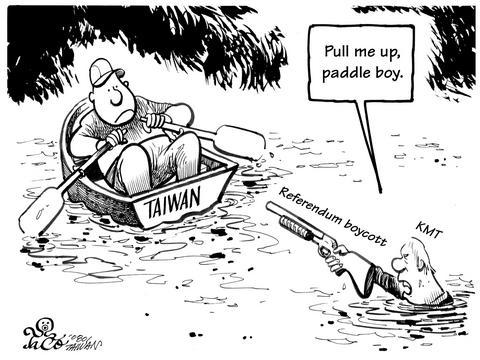
CKS diaries add light to a man of mythology
By Cao Changqing 曹長青
Saturday, Jan 12, 2008, Page 8
The Democratic Progressive Party (DPP) government's decision to remove the honor
guard and military police from the mausoleums of former dictators Chiang
Kai-shek (蔣介石) and Chiang Ching-kuo (蔣經國) resulted in a backlash from the
Chinese Nationalist Party (KMT).
The debate became even more heated when the Chiang family threatened to send the
remains of the two men back to their hometown of Fenghua in China's Zhejiang
Province.
The Hong Kong newspaper Ta Kung Pao recently quoted an academic in Nanjing as
saying the time was not ripe for the relocation of the two Chiangs to China
because it still is unknown whether this is acceptable to the Chinese Communist
Party (CCP), the KMT or the DPP government.
The main reason for this is that no uniform view has formed on Chiang Kai-shek.
The two major political parties in Taiwan and the CCP in China hold different
attitudes toward him. Thus the issue has become extremely sensitive.
The KMT has promoted Chiang Kai-shek as a "great leader," the CCP has criticized
him as a "public enemy" and the DPP regards him as a dictator and the prime
culprit of the 228 Incident.
Last year Chiang Kai-shek's handwritten diaries were made public for research at
the Hoover Institution in the US. Copies of the diaries are available to anyone
with a photo ID. The diaries cover the time from 1915 to 1972, three years
before his death.
Experts on cross-strait relations who have read the diaries believe them to be
authentic and authoritative and say they could overturn KMT and CCP accounts of
Chiang, destroying the sacred image of him as the "great leader" of the KMT and
dismissing the CCP's denunciation of him as "an autocrat and a traitor to the
people."
The diaries could hurt the CCP's interpretation because Chiang claims he and the
KMT led the fight against Japanese aggression -- rather than the CCP, which is
what Beijing's propaganda claims. The diaries claim that because Chiang was
aware that China lacked the national strength to fight Japan at the time, he
tried his best to delay the outbreak of war to allow more time to get prepared.
Yang Tianshi (楊天石), an academic, has said that: "Chiang's diaries are of such
historical value that they could rewrite modern Chinese history."
The diaries could destroy the KMT's image of China through details about
Chiang's private life. They lift the veil on the "virtuous and saintly" man and
show that he first wanted to go into business, play the stock market and study
in the US.
In particular, the diaries claim that Chiang helped Sun Yat-sen (孫逸仙)
assassinate fellow party member and political opponent Tao Cheng-chang (陶成章).
Moreover, the diaries also claim that before withdrawing to Taiwan, Chiang was
aware of the KMT's corrupt practices and that he had proposed to rename the KMT
the "National Labor Party (勞動國民黨)."
After viewing the diaries it is apparent that although Chiang Kai-shek was not a
democratic leader, his fight against Japan and the CCP and promotion of
modernization outweighed his mistakes.
However, the fact that after retreating to Taiwan he imposed martial law and
implemented authoritarian rule like an emperor -- an impression strengthened by
passing his position on to his son -- clearly makes him a dictator.
The military police guarding the statue of Sun Yat-sen at Sun Yat-sen Memorial
Hall will also have to be removed: The time of people guarding statues of
historical figures has passed.
The way the remains of dictators are treated is, after all, an indicator of a
country's democratic maturity.
Cao Changqing is a writer based in the
US. TRANSLATED BY TED YANG